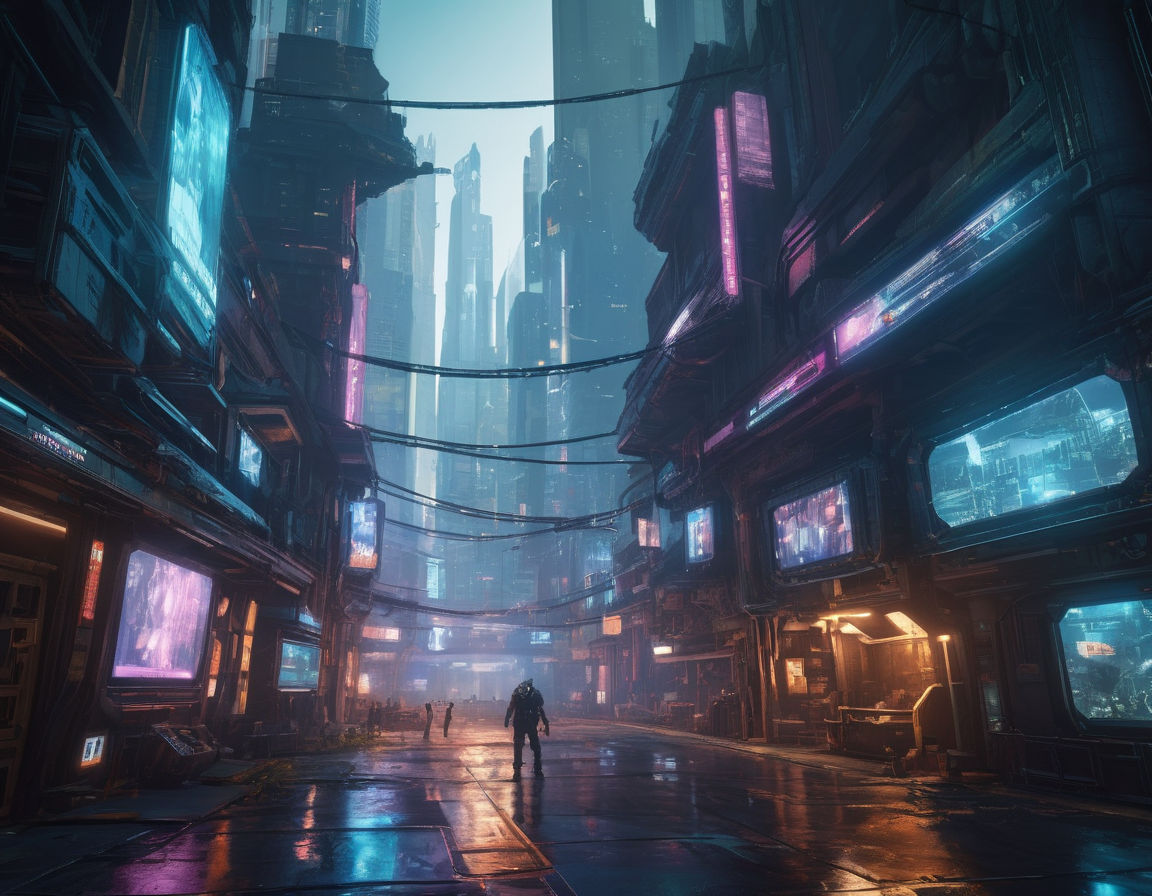Introduction
Artificial intelligence (AI) plays a pivotal role in shaping the gaming industry. From enhancing enemy behavior to enabling procedural content generation, AI technology significantly impacts the overall gaming experience. In this blog post, we will delve into the realm of game artificial intelligence, exploring its importance, evolution, challenges, and advancements within the gaming landscape.
Evolution of Game Artificial Intelligence
In the early days of gaming, AI was rudimentary, with basic scripts determining enemy movements and actions. However, as technology progressed, so did AI in games. Advancements in AI algorithms and computing power have revolutionized how game developers implement AI systems. AI technology has evolved to create realistic and dynamic non-playable characters (NPCs), sophisticated enemy behaviors, and immersive gaming environments.
The impact of AI on game development processes is profound. Developers now leverage AI to create engaging narratives, realistic physics simulations, and interactive worlds. Procedural content generation powered by AI algorithms allows for endless possibilities in game design, ensuring unique gameplay experiences for players.
Historical Perspective
Early AI in games: Examples include simple pathfinding algorithms and decision trees.
Rise of sophisticated AI: Introduction of neural networks, machine learning, and evolutionary algorithms in game development.
Advancements in AI Technology
AI-driven procedural generation: Creating dynamic and personalized gaming landscapes.
Real-time decision-making: Enhancing NPC complexity and behavior adaptability based on player interactions.
AI Challenges in Gaming
Implementing AI in games comes with its set of challenges. Game developers face obstacles such as balancing AI difficulty, ensuring fair gameplay, and optimizing performance. Strategies to overcome these challenges involve a combination of algorithmic improvements, player data analysis, and iterative design processes.
Common Challenges Faced
Balancing difficulty levels: AI should provide a challenge without being frustrating for players.
Fair gameplay: Ensuring that AI opponents behave realistically and respond appropriately to player actions.
Strategies for Overcoming AI-Related Obstacles
Machine learning models: Training AI algorithms to adapt and learn from player behavior.
Player feedback loops: Analyzing player interactions to fine-tune AI behavior and game difficulty.
Examples of Exceptional AI Implementation in Games
The Last of Us Part II: Featuring AI companions with complex behaviors that adapt intelligently to the player's actions.
Hitman 3: Showcasing advanced AI routines for non-playable characters, creating immersive and dynamic environments.
In conclusion, AI continues to revolutionize the gaming industry, pushing the boundaries of what is possible in game development. By understanding the evolution, challenges, and advancements in game artificial intelligence, developers can harness the power of AI to create smarter games that deliver unparalleled player experiences.
Procedural Content Generation

Procedural content generation in video games refers to the technique of creating game content algorithmically rather than manually designing each element. This approach allows for the dynamic generation of game worlds, levels, quests, and more, providing players with unique and endless gaming experiences. By leveraging procedural generation, developers can efficiently create vast and immersive game environments while reducing the need for extensive manual creation.
Explanation of Procedural Generation in Video Games
Procedural generation involves using algorithms to generate content in real-time as players progress through the game. This technique can be applied to various aspects of game development, including terrain generation, item placement, enemy spawn locations, and quest generation. Through procedural generation, games can offer a level of unpredictability and replay value that traditional handcrafted content may struggle to achieve.
Benefits of Using Procedural Content Generation
Increased Replayability: Procedural generation ensures that each playthrough offers a unique experience, encouraging players to revisit the game multiple times.
Efficient Development: By automating the content creation process, developers can save time and resources while still delivering engaging gameplay experiences.
Dynamic Environments: Procedural generation enables the creation of dynamic and responsive game worlds that adapt to player actions, enhancing immersion and realism.
Case Studies of Popular Games Utilizing Procedural Generation
"Minecraft": This iconic sandbox game uses procedural generation to create vast, randomly generated worlds for players to explore and build in.
"No Man's Sky": Known for its procedurally generated universe, this space exploration game offers an endless variety of planets, each with unique flora, fauna, and landscapes.
"Spelunky": A challenging platformer that leverages procedural generation to create new levels each time the player starts a new run, ensuring a fresh experience with each playthrough.
NPC Complexity and AI Behavior
Non-player characters (NPCs) in video games play a crucial role in shaping the player's experience and the overall game world. The behavior of NPCs is often driven by artificial intelligence, which determines how these virtual entities interact with the player, other characters, and the game environment. AI technology is instrumental in creating realistic, dynamic, and engaging NPC interactions that enhance the depth and immersion of gaming experiences.
Role of AI in Shaping Non-Player Character Behavior
AI algorithms are used to govern NPC behavior, dictating actions such as movement, decision-making, dialogue, and combat in games. By simulating intelligent decision-making processes, AI can bring NPCs to life, making them more reactive, adaptive, and believable within the game world.
Techniques for Creating Realistic and Dynamic NPC Interactions
Behavior Trees: A popular method for modeling NPC behavior, behavior trees organize decision-making processes into a tree-like structure, allowing for complex and nuanced actions.
Reinforcement Learning: By applying reinforcement learning algorithms, developers can train NPCs to adapt their behavior based on rewards and consequences, leading to more dynamic interactions.
Natural Language Processing: AI-driven NPCs can engage in conversations with players using natural language processing techniques, enhancing the sense of immersion and realism.
How AI Contributes to the Complexity of NPC Decision-Making
AI not only enhances the behavior of NPCs but also introduces complexity to their decision-making processes. By simulating cognitive abilities such as planning, reasoning, and learning, AI-powered NPCs can react to changing game conditions, adapt their strategies, and provide challenging gameplay experiences for players.
Enhancing Player Interaction through AI
Artificial intelligence plays a significant role in enhancing player interaction, tailoring gameplay experiences to individual preferences, and improving overall immersion. By leveraging AI technology, game developers can create personalized and dynamic interactions that respond to player actions, emotions, and skill levels, ultimately enriching the gaming experience.
Impact of AI on Player Experience and Immersion
AI-driven interactions can make players feel more connected to the game world by creating believable and responsive environments. Whether through realistic NPC behavior, adaptive difficulty levels, or personalized content recommendations, AI enhances immersion and engagement for players.

Ways in Which AI Can Personalize Gameplay Experiences
Adaptive Difficulty: AI algorithms can adjust the game's difficulty based on player performance, ensuring that challenges remain engaging without becoming overwhelming or monotonous.
Dynamic Storytelling: AI-driven narrative systems can tailor the game's story progression and character interactions based on player choices, creating a personalized storytelling experience.
Behavior Prediction: By analyzing player behavior, AI can anticipate actions and preferences, allowing for customized gameplay elements that resonate with individual players.
Examples of Games with Advanced AI-Driven Player Interaction
"The Last of Us Part II": This narrative-driven game uses AI to adapt enemy tactics based on player strategies, creating intense and dynamic combat encounters.
"Red Dead Redemption 2": Known for its immersive open world, this game employs AI to simulate realistic animal behavior, weather patterns, and NPC interactions, enhancing the player's sense of immersion.
"Horizon Zero Dawn": Featuring AI-controlled robotic creatures, this game utilizes advanced AI behavior to create challenging and strategic combat scenarios, requiring players to adapt and strategize effectively.
By integrating artificial intelligence into game development, developers can unlock new possibilities for creating engaging, immersive, and personalized gaming experiences that resonate with players on a deeper level. AI technology continues to push the boundaries of game design, offering innovative solutions for enhancing player interaction and shaping the future of gaming.
The Future of AI in Gaming
Artificial Intelligence (AI) is revolutionizing the gaming industry, continuously pushing boundaries and redefining player experiences. As technology advances, the future of AI in gaming holds exciting possibilities that will shape the landscape of virtual worlds.
Upcoming AI Advancements in the Gaming Industry
Game Artificial Intelligence is evolving rapidly, with developers harnessing its power to create more immersive and dynamic gaming environments. Some key upcoming advancements include:
Enhanced NPC Complexity: AI algorithms are being refined to create non-player characters (NPCs) with more realistic behaviors and personalities, adding depth to in-game interactions.
Smart Games: The integration of AI technologies like machine learning and natural language processing is paving the way for smarter games that adapt to player choices and behaviors in real-time.
Procedural Generation: AI is being leveraged for procedural content generation, allowing for the creation of vast gaming worlds with unique landscapes, characters, and quests.
Predictions for How AI Will Continue to Influence Game Development
Looking ahead, AI is poised to continue shaping game development in profound ways. Some predictions include:
Personalized Gaming Experiences: AI will enable developers to tailor gameplay experiences based on individual player preferences, leading to more engaging and customized games.
Real-Time Adaptation: Games will utilize AI to dynamically adjust difficulty levels, storylines, and environments in response to player actions, ensuring a more interactive and challenging experience.
Improved Player Interaction: AI-driven chatbots and virtual assistants will enhance player engagement by providing helpful tips, personalized recommendations, and interactive dialogue options.
Potential Challenges and Opportunities for AI Integration in Future Games
While the future of AI in gaming is promising, there are also challenges that developers must navigate. Some of these include:
Ethical Considerations: As AI becomes more sophisticated, questions around data privacy, algorithm bias, and player manipulation may arise, prompting the need for ethical regulations and guidelines.
Technical Limitations: Achieving seamless AI integration in games requires robust computing power and data processing capabilities, which may pose challenges for smaller game studios.
Balancing Realism and Fun: Striking the right balance between realistic AI behavior and enjoyable gameplay remains a key challenge, as overly complex AI systems could detract from the overall player experience.
In conclusion, the future of AI in gaming is incredibly bright, offering a glimpse into a world where virtual worlds are more dynamic, immersive, and responsive than ever before. By embracing AI advancements, game developers have the opportunity to create truly innovative and groundbreaking gaming experiences that captivate players around the globe.
Conclusion
In this insightful exploration of Game Artificial Intelligence, we have delved into the transformative role that AI plays in shaping the future of gaming. From predicting upcoming AI advancements to discussing potential challenges and opportunities, it is evident that AI technology continues to drive innovation and enhance player experiences in the gaming industry.

As we look towards the horizon of gaming, it is clear that AI will play an increasingly crucial role in shaping virtual worlds, challenging developers to push boundaries and reimagine what is possible in interactive entertainment. We invite you to share your thoughts on the role of AI in gaming and join us in envisioning the exciting future that lies ahead.
Join the conversation by leaving your comments below and sharing your insights on how AI is revolutionizing the gaming landscape. Together, let's explore the limitless possibilities that Game Artificial Intelligence offers for the future of gaming.



